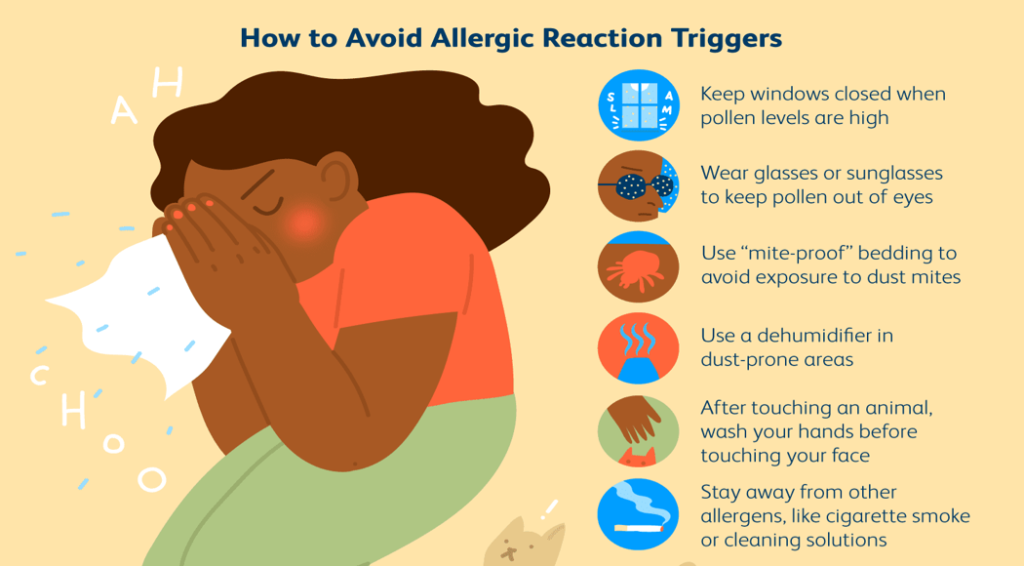What causes allergic rhinitis?
When your body comes in contact with an allergen, it releases histamine, which is a natural chemical that defends your body from the allergen. This chemical can cause allergic rhinitis. Allergic rhinitis develops when the body’s immune system recognizes and overreacts to something in the environment that typically causes no problem in most people. Allergies can affect anyone but those are more likely to develop allergic rhinitis if there is a history of allergies in your family. If both of your parents have hay fever or other allergies, you are likely to have hay fever and allergies too. Having asthma or atopic eczema increases risk of allergic rhinitis.
Some external factors can trigger or worsen this condition ,cigarette smoke,
chemicals, cold temperatures, humidity, wind, air pollution, hairspray, perfumes, collisions, wood smoke, fumes, cleaning solutions ,pool chlorine , car exhaust, air freshener.
Types of allergic rhinitis :

- Seasonal allergies usually occur during the spring, summer and early fall season and are typically in response to outdoor allergens like pollen (trees, grasses or weeds) or molds and spores
- Perennial allergies can occur year round, or at any time during the year in response to indoor substances like dust mites, pet hair or dander, cockroaches or mold.
Symptoms :

- Itchy nose ,sneezing ,redness.
- Running nose ,post nasal drip,sometimes loss of smell.
- A stuffy nose due to blockage or congestion.
- Itchy ,watery eyes with redness. Swollen, puffy eyelids.
- Dark circles under the eyes.
- Sore,scratchy throat. Irritation in throat with sensation of mucous in throat.
- Frequent headaches
- Eczema type symptoms, such as having extremely dry, itchy skin that can blister and weep.
- Hives.
- Excessive fatigue.
- Dry, irritating cough .Sometimes patient feels breathless.
Patient usually feel one or more of these symptoms immediately after coming into contact with an allergen. Some symptoms such as recurrent headaches, fatigue , facial pain caused by blocked sinuses, inability to sleep from symptoms keeping you wake up at night, development or worsening of asthma symptoms may happen after long term exposure to allergens.
Allergic rhinitis in children:

In children allergic rhinitis typically appears before the age of 10.If you notice that your child develops cold like symptoms at the same time each year, they probably have seasonal allergic rhinitis.
Children usually develops watery, bloodshot eyes, which is called allergic conjunctivitis. If you notice wheezing or shortness of breath in addition to other symptoms, your child may have also developed asthma.
Many parents say that their children are more moody or irritable during allergy season. In some children , parents may notice decreased concentration and focus in studies, impaired hand eye co-ordination, decreased decision making capacity, poor school performance.
Tips to prevent allergies:

- Wash your hands immediately after petting any animals, wash your cloths after visiting pets.
- Wear glasses or sun glasses when outdoors to minimize the amount of pollen getting into your eyes.
- Avoid exercising outdoor early in the morning.
- Cover your nose and mouth while performing yard work.
- Bathe your dog at least twice per week to minimize dander.
Homoeopathic management of allergic rhinitis:
Constitutional homoeopathic treatment for allergic rhinitis is by treating the underlying root cause of problem by stimulating the weakened immune system and focuses on improving the overall wellbeing of the individuals by controlling the symptoms and discomfort.
We have treated many cases of allergic rhinitis (nasal allergy) and given significant relief to a large number of them. Our holistic approach helps them to overcome the illness and leads a better quality of life.
The medication targets the body’s immune system whereby it reduces the hypersensitivity to the allergens .Over a period of time, the patient reacts less aggressively to the allergens and gradually the hypersensitivity is cured.
It must be noted that even during the period of treatment, patient may continue to get attaches of allergic rhinitis(nasal allergy).However these episodes are less sever and last shorter as compared to attacks before commencing treatment.
Patients gradually notices an overall improvement in the general health as the treatment progresses. Even in chronic cases of a long standing nature homoeopathy has significant help to offer in terms of prevention of the complications. It is strongly suggested that patient with allergic rhinitis (nasal allergy) opt for homoeopathic treatment as soon as possible.
Potential benefits of the homoeopathic treatment in reducing symptoms and improving quality of life in patients with seasonal allergic rhinitis were conformed.
Research suggests that homoeopathic treatment for allergic rhinitis may be ideal because this type of therapy acts as an immunoregulator or immunomodulator, possibly regulating or reviving the immune system.
Homoeopathy indeed has the credit of relieving a large number of patients from the distress of allergic rhinitis (nasal allergy).
